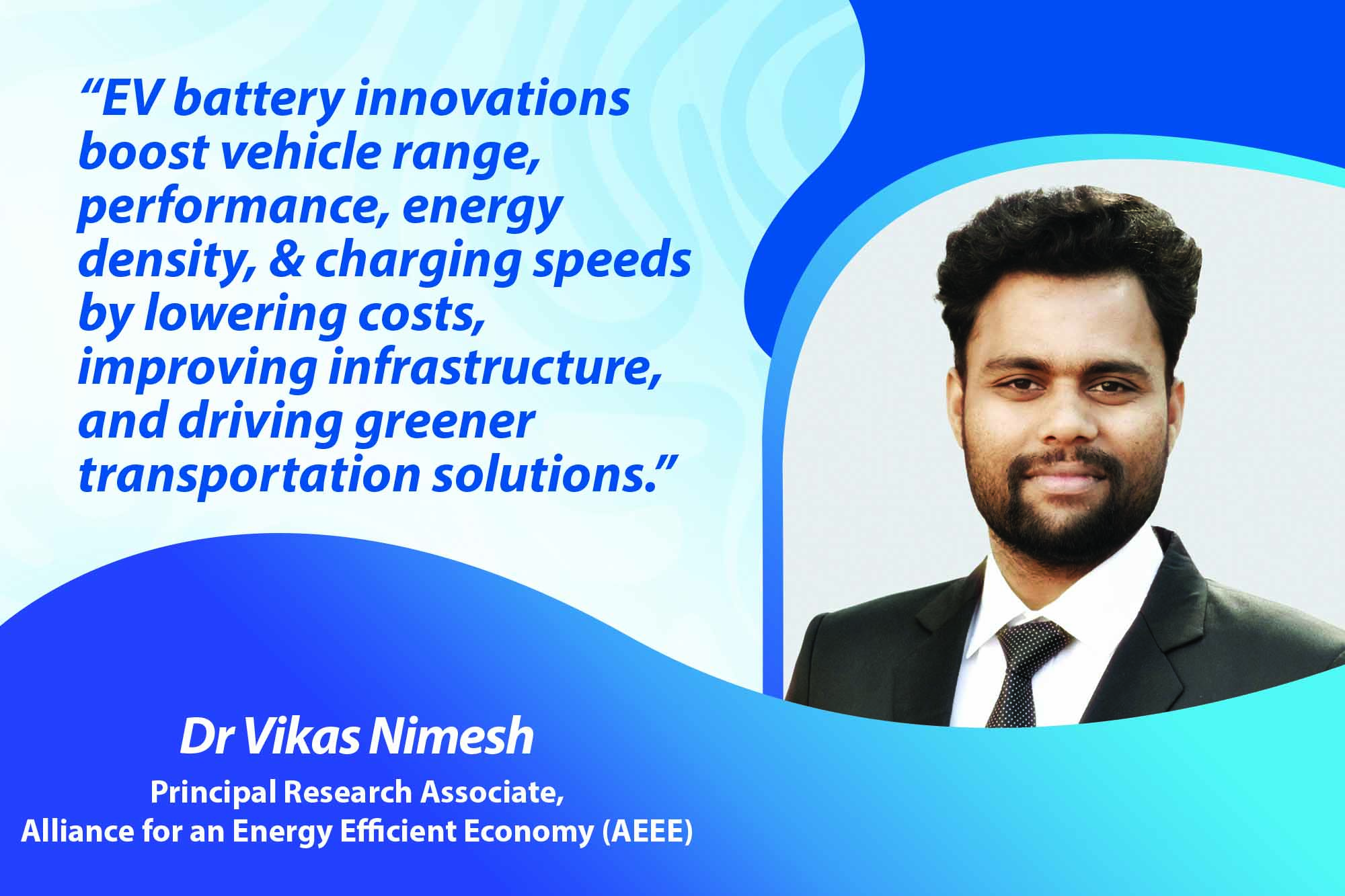Fuelling e-mobility with breakthroughs in battery technology
By EPR Magazine Editorial June 25, 2024 6:11 pm IST
By EPR Magazine Editorial June 25, 2024 6:11 pm IST

EV battery innovations boost vehicle range, performance, energy density, & charging speeds by lowering costs, improving infrastructure, and driving greener transportation solutions.
Spokesperson: Dr Vikas Nimesh, Principal Research Associate, Alliance for an Energy – Efficient Economy (AEEE)
How do breakthroughs in EV battery technology enhance vehicle range and performance?
Breakthroughs in EV battery technology, such as the development of solid-state batteries and advancements in battery management systems (BMS), significantly enhance vehicle range and performance. Solid-state batteries offer higher energy density, leading to longer driving ranges and faster charging times. Improved BMS ensures optimal battery usage, extending lifespan and maintaining performance. Other promising technologies include lithium-sulphur batteries, which offer higher energy capacity, and silicon-anode batteries, which increase energy density and charging speed. Innovations like lightweight materials and advanced thermal management systems contribute to improved safety and reliability. Additionally, advancements in manufacturing processes and material efficiency reduce costs, making EVs more affordable and accessible.
How can the charging infrastructure network improve for the benefit of users, and how has digitalisation impacted it?
The charging infrastructure network is being improved by expanding fast-charging stations, enhancing digitalisation through mobile applications, and utilising IoT-enabled chargers and smart grids. These advancements reduce charging times, increase convenience, and encourage more people to switch to electric vehicles, enhancing the overall user experience.
How can we optimise the recycling and disposal of EV batteries for sustainable practices?
Optimising the recycling and disposal of EV batteries involves developing efficient methods for recovering valuable materials like lithium, cobalt, and nickel. Advanced recycling techniques, such as hydrometallurgical and pyrometallurgical processes, improve the yield and purity of recovered materials. Promoting second-life applications for used batteries in stationary energy storage systems extends their lifecycle and reduces waste. Establishing clear regulations and standards for battery disposal and recycling ensures that these practices are environmentally sustainable, reducing the ecological impact of EV batteries.How can government policies drive advanced battery development and renewable integration?
Government policies drive advanced battery development through R&D funding, tax incentives, and subsidies. Regulatory frameworks like emission standards, norms, and recycling mandates stimulate market demand. Public-private partnerships and global collaborations enhance resources and knowledge. Infrastructure and strategic roadmaps ensure a strong supply chain and policy consistency. Education and certification programs cultivate skilled workforces and consumer trust. Collaborative efforts among governments, industries, and research boost innovation, accelerating the adoption of advanced batteries and renewable integration. Indian initiatives like PM Solar Rooftop and Solar Parks schemes bolster the sustainable EV transition through solar energy promotion.
How do we integrate renewables with EV charging for a greener transportation ecosystem?
Integrating renewables into EV charging involves using solar and wind energy to power stations, reducing fossil fuel reliance. Second-life EV batteries balance renewable supply with smart grid tech for stable energy. Smart charging adjusts to renewables, optimising efficiency. Developing renewable-powered stations with storage supports this, alongside V2G tech. Government incentives and partnerships refine and scale these efforts, reducing EVs’ carbon footprint and promoting clean energy use in transportation.
The advancement of EV battery technology, from solid-state batteries to advanced BMS, is a significant step towards sustainable transportation. If these technologies are integrated with renewable energy sources, they will make clean, efficient transportation more accessible.
We use cookies to personalize your experience. By continuing to visit this website you agree to our Terms & Conditions, Privacy Policy and Cookie Policy.